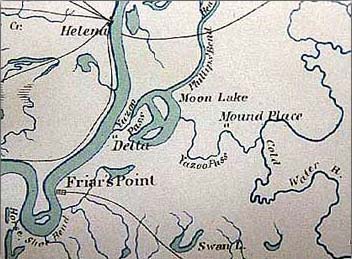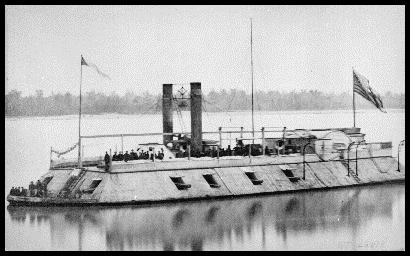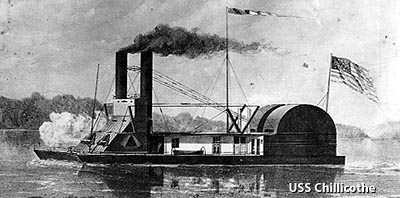Yazoo Pass Expedition
A Failed Attack on Fort Pemberton
24 February - 5 April 1863
The Yazoo Pass Expedition occured in Mississippi during February and March 1863, as part of an effort by General Grant to capture Vicksburg. The plan was for a joint Army-Navy force to go through the Yazoo Pass, about 300 miles north of Vicksburg, and proceed via the Coldwater, Tallahatchie, and Yazoo Rivers to reach high ground east of Vicksburg. The Navy provided two iron-clads, six tin-clads, and two rams, which were joined by a division of 4,000 men under the command of General L.F. Ross.
 The expedition cleared the Coldwater River on 6 March, and reached the junction of the Tallahatchie and Yazoo Rivers on the 10th. Here the Confederates had constructed Fort Pemberton, and sunk the Star of the West in the river channel as an obstruction. The fortifications were composed of seven tiers of cotton bales and eight feet of earth outside, with several heavy guns.
The expedition cleared the Coldwater River on 6 March, and reached the junction of the Tallahatchie and Yazoo Rivers on the 10th. Here the Confederates had constructed Fort Pemberton, and sunk the Star of the West in the river channel as an obstruction. The fortifications were composed of seven tiers of cotton bales and eight feet of earth outside, with several heavy guns.
Chillicothe and Baron DeKalb, with the other ships of the Yazoo Pass Expedition behind, engaged Fort Pemberton. However, the river was so narrow that only two gunboats could attack at any one time and the area around the fort was so waterlogged that troops could not be landed. The expedition ultimately had to retire without achieving its purpose.
With the fleet tied up at the nearby Curtis Plantation, the 46th Indiana was sent out on reconnaissance. They soon encountered Rebel pickets, and skirmished in the woods briefly before the Confederates began retreating to the safety of their fort. The 28th Wisconsin was ordered down the right bank of the river in support of the 46th Indiana. The iron-clad Chillicothe steamed down into view of the fort and began lobbing 11-inch shells.
Ultimately, the Federal Naval guns were unable to inflict much damage on the fort, and the infantry found little firm ground on which to mount an attack. The expedition withdrew on 5 April, leaving its mission incomplete.
This was one of the 28th Regiment's first combat situations during the Civil War. The story is told by members of the 28th Regiment, as recorded in their diaries and letters.
The following soldiers have been quoted for this story:
Capt. Enos: (aboard steamer St. Louis) During the day we passed many splendid plantations, most of them deserted by the white people, and left in the sole possession of the 'colored' population, who greeted us with every demonstration they could think of--waving of hats and handkerchiefs, jumping up and down, clapping of hands, shouting, &c.-- In some instances there were the whole black populations of a plantation standing upon the bank, with their bundles, a mule or two, a bale of cotton which they had succeeded in saving from the rebels ...
Capt. Stevens: We landed yesterday two miles above here, and marched down here about 3 P.M. The gunboats were one or two of them in advance. While we were marching down, one of the gunboats opened on the Rebel battery, which almost immediately replied, and here we had our first sight & heard the first sounds of real war.... The first shot fell just at my left and opposite the head of my company, as we were marching down the river bank, striking the water about 4 rods from me. The next passed just over our heads. The third struck a tree in front, bringing down some dead limbs about Col. Lewis' horse's heels.
Sgt. Barker: ...we marched into the woods toward the fort with our drum corps playing a lively tune and the Rebel shell screaming over our heads. We had not gone far into the woods when the enemy got range on us by the sound of the music and sent a sixty-four pound shot that lodged in a large oak tree just in front of the regiment, and I often think how many lives that tree saved for us.
Sgt. Sawyer: Shortly, the second gun was fired, and again another and another, until someone suggested to the Colonel that it would be proper for our regiment to file right into line of battle and thus relieve ourselves from the dangerous exposure of marching into the face of the enemy by columns of fours. At the same time a request was made that the band cease playing. That scene was quite novel, that a regiment should march up before the enemy in columns of fours, as much to say, we desire to give you all notice possible that we are coming. We soon learned by experience that this was not considered good military tactics.
Capt. Stevens: One of our gunboats met with quite an accident, & hauled off. They were loading, when a shell struck the shell they were putting in when they both exploded, killing one man and wounding 18. Three have since died. This was all there was of the engagement. Our regiment was out on picket all night, and are yet. We are to be relieved at 11 o'clock today.

The Baron DeKalb, formerly known as the St. Louis.
Capt. Enos: This morning, while standing at this battery, (which is within 500 yards of the rebel fort) in company with Gen. Rose, Salomon and Fisk, the enemy fired two guns at us. The balls made merry music among the limbs of the trees over our heads, and sent us all back to the rear in 'double quick time', I assure you.
Sgt. Barker: Several days were spent skirmishing and getting ready to take the fort. A council of officers was held and it was decided that the two gunboats, Chillicothe and Baron De Kalb, with the land battery we had made, could silence the guns in Fort Pemberton, and then a good storming party could capture the fort. Five companies of the 28th were chosen for this duty, and they went on board the gunboat Signal while the other boats opened fire on the fort, but two guns of the Chillicothe were soon disabled, so that they all withdrew, and the 28th was saved from slaughter.

Sgt. Sawyer: After several days skirmishing as well as firing on the part of our line of batteries and gunboats we deemed it impossible for us to capture Fort Pemberton in our front. Orders were issued for the return of the entire command to Helena (Arkansas).
Cpl. Wildish: We start early this morning and run pretty fast all day. About noon come to a halt, turn around, and go back again down the river. This goes rather against the grain with most of us.
Sgt. Sawyer: On going back up the Tallahatchie we met Gen. Quinby coming down with re-enforcements, also with orders for us to return and make a second attack on the enemy.... all of which we did, going through the same maneuvers that we did before.
Cpl. Wildish: Quinby's brigade has joined us. We arrived at our old camping ground at about 2 o'clock today. Our regiment is gone out on picket. Cos. A and B are left behind. It begins to rain. Our cavalry boys brought in fourteen rebel prisoners. Went to see them. These are the first secesh I have seen.
Capt. Stevens: Still we are here in our old position, getting ready for the siege of the fort...our forces are getting siege guns mounted, making reconnoisances &c. We are kept pretty busy with picket and other duties. The Rebels continue to fire at us as we are at work on the fortifications. Shot & shell reach us there quite profusely at times, though they usually fire only once in every half hour or so, except they discover some party of men moving in that vicinity, when they fire oftener.
Cpl. Wildish: Bake some cakes today. Wonder what mother would think to see me mixing up dough. The boys are all busy cooking up their flour this forenoon. We don't make very much progress in the way of taking the fort. We read in the papers today that we are clear down to Yazoo City. So much for the papers.
Cpl. Wildish: Today we make a raid out into the country. We go onto the boat, went up the river ten miles, then marched ten more out to McNutt, the county seat of some county. We took twelve prisoners and as many horses.
Sgt. Sawyer: A small portion of our regiment went out on a scout one afternoon to a little town called McNutt and captured some Confederate mail.
Capt. Stevens: As I had anticipated we were ordered on board the boats Saturday evening, and at daylight... our pickets were called in, and we left for Helena - or somewhere else. I think the Rebels could have been captured if a persistent effort had been made to do it, but it may be as well as it is. We have left something like a dozen dead upon the banks of the Tallahatchie... other regiments have probably lost as many in proportion.
| 
